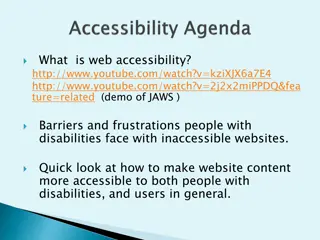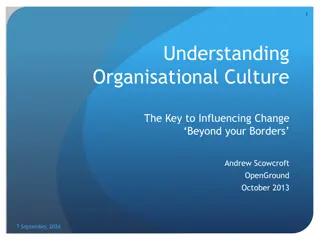
Making BI Accessible to Diverse Business Cultures
Explore strategies to make Business Intelligence (BI) resonate across global business cultures, ensuring that fully working BI tools and insights are tailored and effective for every team and locale.
Download Presentation

Please find below an Image/Link to download the presentation.
The content on the website is provided AS IS for your information and personal use only. It may not be sold, licensed, or shared on other websites without obtaining consent from the author. If you encounter any issues during the download, it is possible that the publisher has removed the file from their server.
You are allowed to download the files provided on this website for personal or commercial use, subject to the condition that they are used lawfully. All files are the property of their respective owners.
The content on the website is provided AS IS for your information and personal use only. It may not be sold, licensed, or shared on other websites without obtaining consent from the author.
E N D
Presentation Transcript
Making BI Accessible to Diverse Business Cultures -------------------------------------------------------------------------------------------------- With a 7.6% CAGR, the global Business Intelligence market as a whole is expected to grow from $23.1 billion in 2020 to close to $33.3 billion by 2025, highlighting the vital role of working BI. The stakes are high. But the question remains: How can organizations across different cultural landscapes harness this potential fully? In a global marketplace, where data flows as freely across borders as currency, making Business Intelligence work for every business and team member, regardless of their geographical or cultural context, is a necessity.
Imagine the power of BI tools finely tuned to meet the unique needs of each locale your business touches. As businesses worldwide strive to adapt to these Business Intelligence trends, can a single BI strategy accommodate the intricate complexities of global business practices? How do you ensure that the insights derived from working BI tools are as relevant and actionable in the bustling streets of Tokyo as they are in the tech hubs of Silicon Valley? The journey to global BI accessibility is paved with challenges, from overcoming language barriers and local regulatory constraints to ensuring that data visualization speaks universally. Yet, it is within these challenges that the greatest opportunities lie to innovate, to bridge divides, and to create a cohesive, data-driven culture that transcends borders. Join us as we delve into the strategies for making Business Intelligence technologies accessible to diverse business cultures, exploring not just the "how" but the "why" of adapting BI practices for global inclusivity. Understanding Diverse Business Cultures Diverse business cultures include a wide range of practices, beliefs, and regulatory frameworks. From multinational corporations with teams spread across continents to local businesses aiming for global reach, the variance in business operation models is vast. These differences can significantly affect how BI tools and strategies are adopted and implemented. Recognizing and respecting these differences is the first step in crafting a BI approach that is truly global. What are the key Strategies for making BI accessible? A. Localization of BI Tools The Importance of Language and Cultural Nuances in BI Reporting Localization is not merely about translating the language used in Business Intelligence technologies; it's about adapting these tools to reflect the cultural nuances, idioms, and business practices unique to each locale. This adaptation ensures that BI reports are meaningful and actionable across different cultural contexts. For example, a BI dashboard designed for a U.S.-based company might prioritize data visualizations that are direct and to the point, reflecting a low-context culture. However, in high-context cultures, such as Japan, users might benefit more from detailed reports that provide comprehensive context around the data. B. Customizing Training for Diverse Teams Developing Inclusive Training Programs
Customizing backgrounds is crucial for fostering effective BI adoption. This means providing training materials in multiple languages, adapting teaching methods to suit the preferred learning styles of different cultures, and using examples that are relevant to the learners business context. training programs to fit various learning styles and cultural The Role of Internal Champions and Mentors Internal champions and mentors play a pivotal role in driving BI adoption within diverse teams. They act as liaisons between BI teams and the broader organization, providing support, answering questions, and showcasing the Business Intelligence tools benefits. Their deep understanding of both the local culture and BI capabilities enables them to tailor their mentoring approach, ensuring that BI tools are utilized effectively across the organization. Scott Smith, CEO of Launch Leads, acted as a key advocate for Grow, using it to give his team real-time access to KPIs and encouraging everyone to make data-informed decisions. His approach proves how powerful it can be when leaders champion the use of BI tools within a company. C. Building an Inclusive Data Culture Encouraging a Data-Driven Culture Creating an inclusive data culture requires strategies that transcend traditional top-down approaches. This involves engaging with various departments and stakeholders early in the BI process to understand their data needs and preferences. Techniques such as hosting data literacy workshops and offering self-service BI tools can empower employees across the organization to engage with BI initiatives actively. Involving Different Departments and Stakeholders Ensuring buy-in from various departments and stakeholders is essential for successfully integrating working BI. This can be achieved by demonstrating the Business Intelligence tools benefits directly to their specific roles and responsibilities, thus leading to a collaborative and data-driven environment. Discover how Grow can transform your team's data into a powerful conversation starter. See the impact firsthand connect your departments and drive growth with clear, collaborative visuals. Start your 14-day free trial journey with Grow today. D. Adapting BI Solutions to Local Regulations Overview of Data Protection and Privacy Laws
The variance in data protection and privacy laws across regions significantly affects BI implementation. For instance, the European Union s GDPR imposes strict rules on data handling and privacy, necessitating BI solutions that are adaptable to these regulations. Best Practices for Compliance To ensure compliance while maintaining the integrity and usefulness of Business Intelligence technologies, organizations should adopt a privacy-by-design approach in their BI solutions. This includes implementing robust data governance frameworks, conducting regular data audits, and ensuring that data handling practices are transparent and comply with local regulations. Conclusion Making BI accessible in diverse business cultures is a multifaceted challenge that requires thoughtful strategies around localization, training, cultural inclusion, and regulatory compliance. Organizations focusing on these areas can unlock the full potential of Business Intelligence technologies. This not only keeps them on top of Business Intelligence trends but also enhances the advantages of BI tools. Grow exemplifies a BI solution adept at meeting these diverse needs, particularly evident in how it fulfilled Edit Suits' global requirements. By consolidating scattered data into a centralized, easy-to-use platform, Grow enabled Edit Suits Co. and over 20,000 other such businesses to maintain a cohesive strategy across its international locations. This adaptability and efficiency make Grow an invaluable tool for businesses aiming to make BI a core aspect of their decision-making processes, regardless of geographical and cultural differences. For those considering Grow, further insights into Grow Reviews Cost & Features GetApp showcase why Grow is a favored option for companies navigating the intricacies of a diverse business environment. With Grow, companies can streamline data into actionable insights, perfectly tailored to their unique business landscape.






















